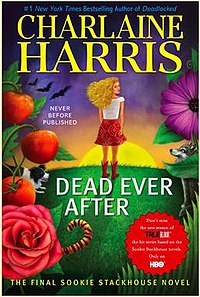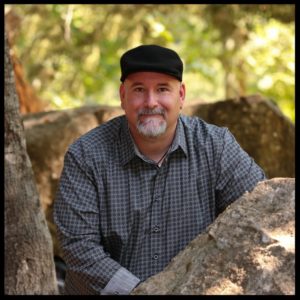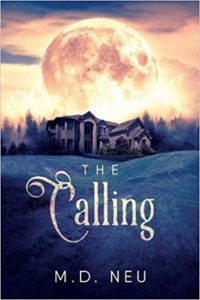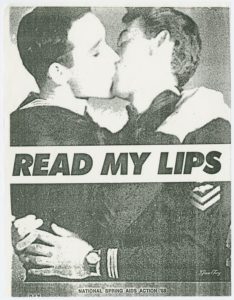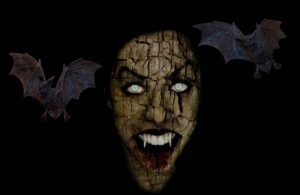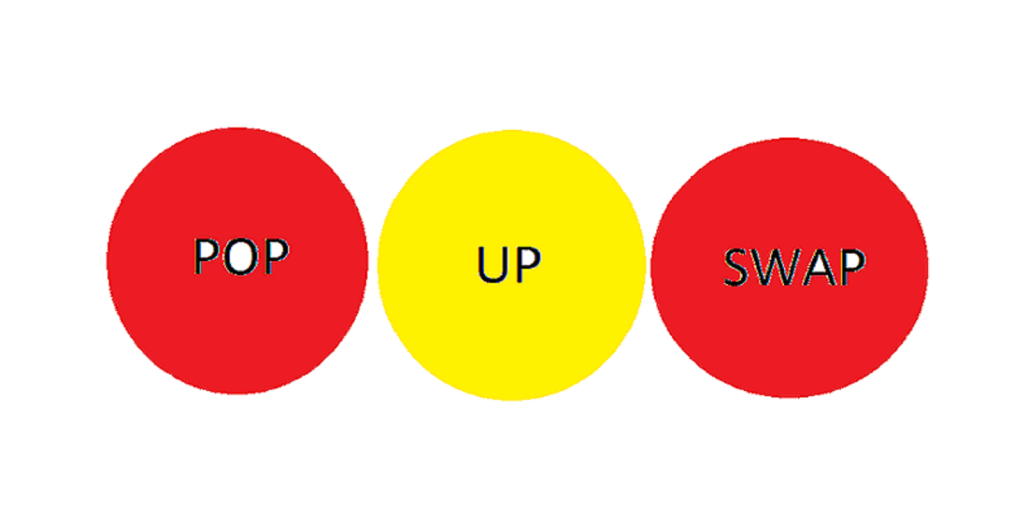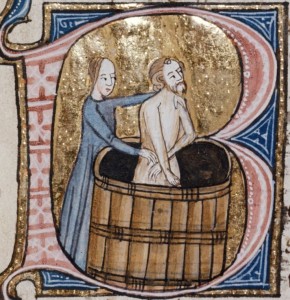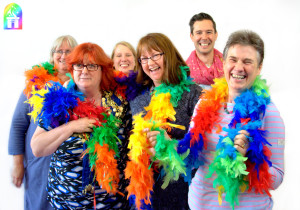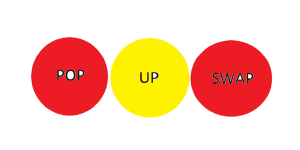
Hello my long-neglected darlings! Papa’s back (with strange new affectations you may have noticed), and he’s got a long and meaty Pop Up for you.
Wow. That didn’t sound as creepy in my head as it came out on the page. This isn’t that kind of blog. What I have today is my author exchange with horror/fantasy/erotica author Tom Cardamone. I guess the erotica part had double entendres on my brain. I read Tom’s short story anthology Night Sweats, and he read my recently published anthology Slashed and Mashed: Seven Gayly Subverted Stories.
This Pop Up will be a two-parter. Today I post my interview with him, and I’ll post our conversation about me next week.
Here’s Tom’s impressive bio:
 Tom Cardamone is the editor of Crashing Cathedrals: Edmund White by the Book and author of the Lambda Literary Award-winning novella, Green Thumb, as well as other works of fiction and non-fiction. You can read more about him and his writings at www.pumpkinteeth.net. And check out Crashing Cathedrals over at ITNA Press.
Tom Cardamone is the editor of Crashing Cathedrals: Edmund White by the Book and author of the Lambda Literary Award-winning novella, Green Thumb, as well as other works of fiction and non-fiction. You can read more about him and his writings at www.pumpkinteeth.net. And check out Crashing Cathedrals over at ITNA Press.
I met Tom years back when we were both tabling for Bold Strokes Books at the NYC Rainbow Book Fair. How far back? Meh. These days I’m lucky if I can answer that with an accurate range, but I’d say it would have to be somewhere between 2013 and 2015. A few years later, we joined up again at NYC’s inaugural queer comic-con Flame-con. And we hit it off and kept in touch. I’d read an anthology he edited: The Lavender Menace: Tales of Queer Villainy so I was already a fan. Then I read his novella Green Thumb and loved it, and I reviewed his erotic-fantasy The Lurid Sea for Queer Sci Fi.
Here’s the back cover blurb from Night Sweats.
Set in Japan, small town America, midnight Manhattan, ancient Greece and Rome, and beyond, these stories run the gamut of urban nightmare, gay love lost and found, dragons, super villains, a fairy addicted to meth, and Satan on the subway. Readers of Night Sweats will find tales that push boundaries while supplying ample scares, erotic thrills, much wonderment, and some woe.
So let’s dive in!
AP: Tom, you know I’ve been an admirer of your writing for some time. Big thanks for taking part in the Swap.
I loved Night Sweats. It left me with so many lasting images, from Cyclops babies to giant owls descending on small towns in New England to hallucinogenic fairy snot. I’ll get to some of your inspiration points and storytelling approaches, but I wanted to say off the bat, that quality of taking readers to places they haven’t been before is really present across the collection and pretty darn impressive.
I wanted to start though with more of an editing and production question. What was the process like for you selecting and ordering the stories? Slashed and Mashed was my first short story collection, so it got me intrigued about how other writers navigate that process, and maybe you could share with me and my visitors how you saw your stories fitting together as an anthology?
TC: Thank you for that outstanding introduction! I’ve enjoyed your work as well, and think Slashed and Mashed really covers some important ground, so congrats there! It’s one of those books that I wished had existed and been accessible in my youth.
To your question of story selection: years and years ago I read Nabokov’s Dozen, which featured thirteen of the maestro’s stories, and it’s stuck in my head that thirteen is the magic number. That said, I also pay attention to the flow, as if they were pieces of a quilt, and then the greater story tells itself, in terms of which one belongs at the beginning, the middle, the end and so on.
Also, and I think this applies to other writers as well, there are always pieces that are interesting but maybe experimental, too short or too weird to find a home anywhere else but in a collection of your work, where the consistency of your voice gives them buoyancy and permanency, so I’ve always written stories that I’ve never tried to place, but just crossed my fingers and thought “If I ever cobble together another collection, I know right where I’m going to plant this dark little seed. . .”
AP: That’s a great point. I’ve got some dark little seeds myself.
There’s a lot to love about your collection, and related to that topic of theme and subject, I’ve read two of your longer books, which were both on the dark and gritty side. With Night Sweats, you certainly included stories in that vein with characters on the margins like “Honeysuckle” and taboo orgiastic adventures like “Diabolical” and “Halloween Parade.” If I’m remembering correctly, there’s just one love story with a heartwarming, happy ending: “Blue Seaweed,” which I suspect was a germination point for your longer work about Nerites by the way, no?
TC: “Blue Seaweed” reflects my obsession with ancient history and myth, a fascination we share! This story, about a Greek boy during the time of the Roman Empire who meets a Godling from the sea and sparks fly, underwater as it were -this was one that gestated over a long period of time, and benefited from early readers, something I rarely do, but I did want love to win with this one.
AP: Nice. I’ve mentioned with regard to Green Thumb, your writing reminds me of William S. Burroughs in its hallucinogenic lyricism (or lyrical hallucinogenics?), and your work explores similar themes about the gay experience like lust and desperation and cruelty and loneliness and jealousy. Those were major themes from gay writers of the 1960s, 1970s, and 1980s. I’m thinking of John Rechy, Edmund White, and Paul Rogers whose work I devoured in high school and college.
I’m great at long, meandering lead-ins to questions, and I also have a tendency to wrap up several of them together. Who do you see as your influences?
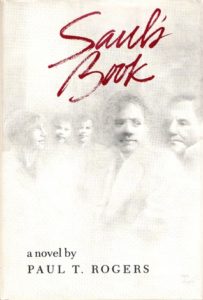 TC: Well thank you for the awesome Burroughs comparison, I’ve certainly read most of his work. And you’ve certainly hit upon some of my major influences. It’s very nice to hear Paul Rogers get name-checked. His lone novel, Saul’s Book, is astounding, more so once you learn he was murdered by his lover and adopted son shortly after publication.
TC: Well thank you for the awesome Burroughs comparison, I’ve certainly read most of his work. And you’ve certainly hit upon some of my major influences. It’s very nice to hear Paul Rogers get name-checked. His lone novel, Saul’s Book, is astounding, more so once you learn he was murdered by his lover and adopted son shortly after publication.
Another writer I admire, Paul Russell, wrote about him in a book I edited: The Lost Library: Gay Fiction Rediscovered. Other writers who have influenced me, especially early on, are Kathe Koja, Octavia E. Butler, Geoff Ryman and John Varley. Stylistically and the breadths and depths of their imaginations leave me breathless, which is what I hope some of my readers feel as well. The gay writers that you referenced, along with Saint Genet, are definite influences as well.
AP: I’m ashamed to say I’m only familiar with Geoff Ryman and Genet, but I can see the connection in both cases. There’s a haunting sadness in a lot of Geoff Ryman’s work and Jean Genet of course was provocative and unapologetic in his approach to sexuality.
I mentioned before I sensed some of the stories fed into your longer work. “Blue Seaweed” and “The Love of the Emperor is Divine” reminded me of The Lurid Sea for different reasons. I also got hints of Green Thumb here and there, not the post-apocalyptic setting but from your depiction of anthropomorphic characters and the eroticization of the unusual and from the tone of death and desperation. All of which makes for great, high impact reading by the way.
I don’t write short fiction nearly as much as you do, but I did have the experience of some of my shorter work leading into writing a novel. Around the time I wrote “Theseus and the Minotaur” from Slashed and Mashed, I wrote an experimental piece about Telemachus from The Odyssey and another based on the Nerites myth. It hit me later: hmm, what would happen if these four gay boys met up and had an adventure? That turned into a YA buddy comedy I’m currently pitching around.
Do you find that your shorter work stimulates an interest in writing longer pieces? I know you write both, and I’m curious if you find yourself more at home with short versus long?
TC: Confession: I write short fiction mostly to avoid novel-length projects, so I can feel productive while still dragging my feet.
AP: Alrighty. I’ll step back from that one.
Back to the fantasy subject, I recognized little reference points here and there — Greek/Roman sea godlings in “Blue Seaweed” and the superhero/super villain theme in “The Ice King” and “Kid Cyclops” — but there’s a lot of originality with the characters and situations. You have a spectacular imagination.
A common thread is alienation and the line between beauty/desire and the grotesque/repulsive. I mean, you have two stories with men fellating a pretty gory, reptilian devil. “Halloween Parade” concerns a guy looking to have sex with Michael Myers. Here comes my deep question, what do you think your choices of subject and I guess I’d say aesthetic have to say about your worldview and/or just your own experience in the world?
TC: I think it’s my commitment to going in a different direction, to figure out what we avoid talking about and having a full discussion right there, no matter how uncomfortable the subject matter.
AP: Interesting. I think that’s what makes your work high impact for me as I said. It’s confrontational, and whether or not you like the characters or the situations, they stay with you because they make you stop and think.
I have to confess, I used to read gay short fiction regularly, but that was before I hatched the great idea to start plodding through writing novels about ten or so years back. So I’ll share some of the short fiction writers I admire, but I bet you’ll be much more up to date than me.
I like Sam J. Miller, Victor Banis, Lawrence Schimel, Scott Hess, and Charlie Vazquez to name a few. Back in the day, I was a big fan of the queer fantasy journal Collective Fallout, which sadly folded in 2013. This year, I reviewed a similar anthology Broken Metropolis, edited by Dave Ring, and it was fabulous and made me appreciate the next generation of up and coming queer writers.
What short fiction writers are you reading these days?
TC: You mentioned some great names! Sam’s in The Lost Library, and Charlie wrote a great piece for a book I’ve recently edited: Crashing Cathedrals: Edmund White by the Book, which is a celebration of Ed’s work, book by book; his oeuvre is seminal, beyond impressive, it’s historical, and putting that together was an adventure.
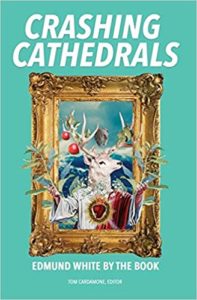 I’m currently reading Trebor Healey’s latest short story collection, Falling, and I love it. It’s astounding how stories that are thematically linked can also be so diverse yet well-drawn. And Craig Gidney is a favorite of mine. I interviewed him about his collection Skin Deep Magic a few years ago, and definitely recommend it as well as his first collection, Sea, Swallow Me and Other Stories. Both are stellar, fans of Tanith Lee will be impressed, and gay boys will see a multitude of reflections in his work that are otherwise hard to find.
I’m currently reading Trebor Healey’s latest short story collection, Falling, and I love it. It’s astounding how stories that are thematically linked can also be so diverse yet well-drawn. And Craig Gidney is a favorite of mine. I interviewed him about his collection Skin Deep Magic a few years ago, and definitely recommend it as well as his first collection, Sea, Swallow Me and Other Stories. Both are stellar, fans of Tanith Lee will be impressed, and gay boys will see a multitude of reflections in his work that are otherwise hard to find.
As you’ve recognized the influence of 80s and 90s gay writers, I must say that I did not know Andrew Holleran had a short story collection, he’s so known as a novelist that this escaped my attention, but earlier this year a friend recommended his book, In September the Light Changes, from 1999. I found a perfect hardback at the Strand and devoured it. So of those times yet timeless.
AP: Great suggestions! Both Healey and Gidney have been on my TBR list for too long. I’m bumping them up per your testimonials.
Onto another topic, the two of us have talked about the state of the gay publishing before, most recently over drinks perhaps to numb the pain. Like me, you’ve bounced around a bit in terms of publishers, and we’ve chatted about the joys and discontents of the changing market and the limited reach of the few remaining small presses for gay fiction versus m/m romance. Perhaps you could share your view based on your experience?
TC: Let me turn that around and reposition it as advice for an up and coming writer: decide now if you’re a commercial artist or an outsider. I knew early on I was in this for the story, and the stories I was going to tell would be from the margins, for the margins. So if you choose the latter, be prepared to do a lot of the heavy lifting, and know that you’ll be genuinely proud when you break new ground, but when you do break new ground, it will be midnight in a wet cemetery and you’ll probably be alone.
AP: Egad. Too true. Well, I do see your point. I think I mentioned this to you before, it’s a sad reckoning that even queer books that garner acclaim through programs like Lambda’s annual awards program often only achieve a small readership.
My last Swap with fantasy author J.P. Jackson got me thinking about how my writing has, and hasn’t, changed over the years. I could go back to what I wrote in grade school as an extreme example, and even though the kind of hack jobs I did back then were pretty hysterically awful, I can recognize some similarities in the way I approached character even those many years ago.
On the other hand, since I started writing with the goal of getting published, I have noticed that my interests have changed a little. My early work was quite serious in tone, and I mentioned my latest work is a buddy-comedy and overall, I’ve been drawn to writing humor more.
Do you find different inspiration points since your first short fiction pieces came out? I’ll attribute my switch to lighter stories as something of a safe zone in which to write about my observations of the world and perhaps, just perhaps as I get older I’m learning to not take myself so seriously. Do you think getting older has influenced your writing?
TC: Aging has had a huge impact on my writing because it has deeply affected my reading. I’ve always read one author biography a year, just to sharpen my literary interests and see what else I can learn about the craft. At some point, during the last ten years, my interest in nonfiction has really perked up. I struggle to finish a novel but can consume a biography in just days. Something inside of me is hungry for the truth, not that fiction doesn’t often lead there, sometimes profoundly so, but I’ve felt for a long time that so much of our history remains untold, uncovered, so that as my readings take me in that direction, I see my writing following that same compass.
AP: I’ve noticed you’re editing and writing nonfiction lately. Selfishly, I hope you’ll return to fiction down the line. What are you writing these days? Do you have upcoming projects?
TC: I’m working on a true crime piece to see if it grows into a book, so stay tuned.
AP: Awesome. Anything else you’d like to say you wish I’d asked? 🙂
TC: Yes, to meet for drinks! We should go to Julius again, though now that it’s cold out, maybe Metropolitan, I love their fire place.
AP: Deal!

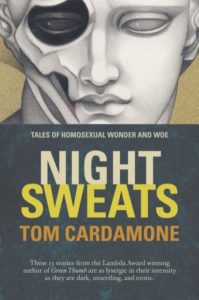
 At night, however, the writing happens, where demons, witches, and shapeshifters congregate around the kitchen table and general chaos ensues. The insurance company refuses to accept any more claims of ‘acts of the un-god’, and his husband of almost 22 years has very firmly put his foot down on any further wraith summonings in the basement. And apparently, imps aren’t house-trainable. Occasionally the odd ghost or member of the Fae community stops in for a glass of wine and stories are exchanged. Although the husband doesn’t know it, the two Chihuahuas are in cahoots with the spell casting.
At night, however, the writing happens, where demons, witches, and shapeshifters congregate around the kitchen table and general chaos ensues. The insurance company refuses to accept any more claims of ‘acts of the un-god’, and his husband of almost 22 years has very firmly put his foot down on any further wraith summonings in the basement. And apparently, imps aren’t house-trainable. Occasionally the odd ghost or member of the Fae community stops in for a glass of wine and stories are exchanged. Although the husband doesn’t know it, the two Chihuahuas are in cahoots with the spell casting.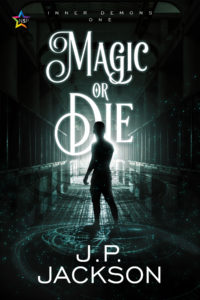
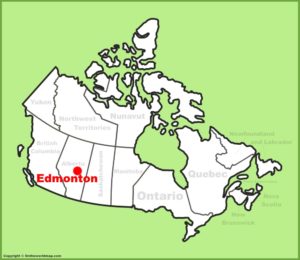 We also have the largest mall in North America if shopping is your thing. I avoid the mall at all costs. Too peopley.
We also have the largest mall in North America if shopping is your thing. I avoid the mall at all costs. Too peopley.